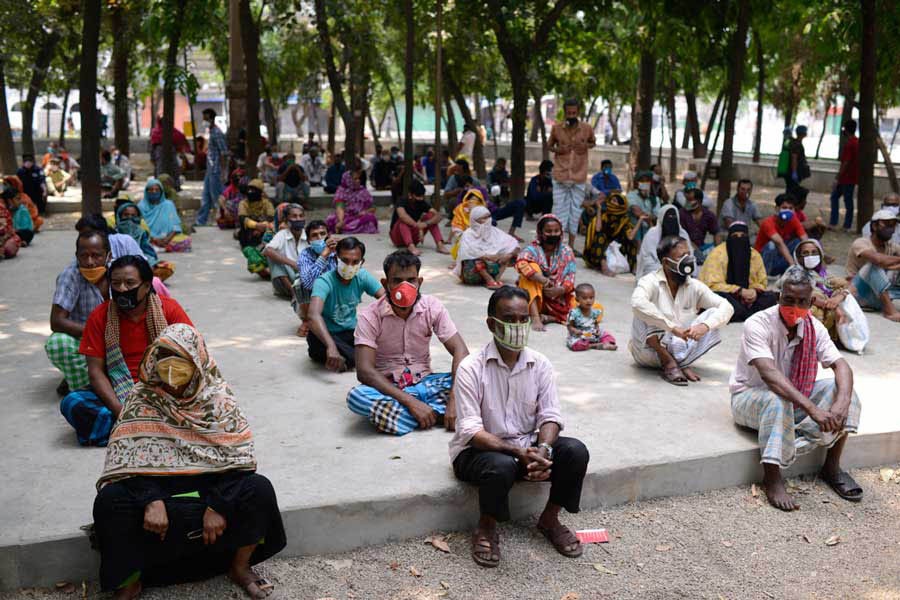Social realities are taking newer, darker shades of meaning in the country. The coronavirus pandemic has been creating havoc in individual and family economies. Tens of thousands of people, mostly in the lower income category, have made their way out of the nation's capital. Judging by the way things have been shaping up, it is reasonable to suppose that whole families have now moved out of Dhaka and to their ancestral villages. And if that is the image in the capital, similar are the circumstances in other urban regions of the country.
It is an exodus to the countryside we speak of, a migration brought about by the exigencies of the situation. With the bread winners of families seeing a lessening in their wages as also a sudden stoppage of wages, their worries have mounted. Hundreds of families, unable to pay house rents to their landlords, have had to move out or live in increasing humiliation. For their part, home owners are in dire straits themselves since for a very large number of them renting out their property has been their only means of income. That is the malady, brought on by the larger malady of the coronavirus pandemic.
When reports filter in of Dhaka University students, those compelled to return to their villages, unable to participate in online classes owing to an inability to possess smart phones or sudden mid-lecture disruptions in internet connections, the slide in social circumstances takes on added meaning. Add to that the sheer callousness that was recently exhibited by landlords who, indignant that their young student tenants had gone home to their villages and had not cleared two or three months of rent, took it on themselves to dump the young people's laptops, certificates and other possessions into neighbourhood dustbins. Covid-19 has brought out in a section of people all those inhumane attributes that have traditionally upended the balance of social order.
Matters are not much helped when, even in these difficult times, corruption has a field day. Home owners in the nation's capital have been slapped with whopping electricity bills, figures that they have never had to deal with before. And, of course, there are the new charges which must be paid for use of mobile phones. At a time when students require easy access to mobile connections in order to pursue academic courses online, such enhancement of rates only worsens the state of family finances. The middle and lower middle classes are paying a high price to keep their heads above the water in these vicious coronavirus times.
Covid-19 has raised levels of poverty. There is little question that by the time it draws to an end --- one is not quite sure when that will be --- millions in Bangladesh will see their lives slip into agonising states of deprivation. A stark picture of what might or will be comes through the plaintive cries of the poor through the nocturnal urban streets asking for food. There are as yet, mercifully, no intimations of an impending famine, though global projections are there of people on their way to just such a condition as the pandemic keeps running riot. When in the streets of Dhaka those cries for food, in choked voices, are heard, something of a tug at the memory takes one back to the Bengal famine of 1943. Thousands of women and children, appealing for 'phan' (the steaming hot water drained out of cooked rice), at the gates of the relatively better off in Kolkata, simply collapsed and died. It is also an eerie reminder of Bangladesh 1974, when as many as 6,000 gruel kitchens were opened to feed the dying in a famine caused by crop failures, floods and geopolitics.
At this point in time, one cannot be sure that those who have left the cities for the villages will be in a position to survive well. For many of these migrants, an absence of income coupled with a probable lack of family resources --- in terms of family owned land or family grown crops or small trade --- can only exacerbate conditions. In the cities, again, schools struggle in double-edged ways: they must keep their academic programmes afloat through online classes; and they must ensure that their teachers receive their salaries on a regular basis. Yet there are the worries when some parents, affluent and so perfectly capable of clearing their children's dues on time, complain that they cannot cough up more than half the school fees.
There are stories of journalists losing their jobs, owing to real problems faced by their media organisations or from an excuse by media owners with long records of backlogs in salary payments deriving full advantage from the Covid-19 situation in keeping their staff in near destitution. There are too all the sordid tales of unscrupulous men administering fake medical centres and swindling people out of their hard-earned income through provisions of false health certificates.
These are dangerous times we live in. A fresh social contract will be in order, with leaders at the local level --- preachers and political workers and teachers and village elders --- called upon to administer means of succour to citizens. The growing queues of the poor will soon mutate into processions of the hungry; the middle classes will slip into poverty with the increasing intensity of the coronavirus. Security packages for families, as distinct from stimulus packages for industries, should be thoughts engaging the minds of policy planners in the corridors of government.
Now more than ever is a paramount need for the outlines of a welfare state to take shape in Bangladesh.
Syed Badrul Ahsan is a senior journalist and writer.
[email protected]


